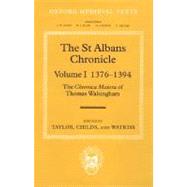The St Albans Chronicle The Chronica Maiora of Thomas Walsingham, Volume I: 1376-1394
, by Taylor, John; Childs, Wendy R.; Watkiss, Leslie- ISBN: 9780198204718 | 019820471X
- Cover: Hardcover
- Copyright: 12/11/2003
Thomas Walsingham, a monk of St Albans, has been described as the last of the great medieval chroniclers. His major work, the Chronica maiora, covers the years 1376 to 1420, and is arguably the most important account of English history to be written in England at this time. Walsingham's texthas never been published as a continuous whole. It is found in no fewer than three separate publications in the Rolls Series, and was printed from manuscripts whose exact identity was not then clearly understood. The nature of the Rolls Series publications, and the different versions of thechronicle, have raised questions concerning the interrelationship of the various manuscripts of the Chronica maiora, and also of Walsingham's own involvement with the text. In this new edition these problems are considered, and the Chronica maiora is shown to be predominantly the work of one man,Thomas Walsingham.Volume I of The St Albans Chronicle (1376-1394) contains that part of Walsingham's chronicle which can with some confidence be said to have been written by 1400. With the exception of a brief contemporary continuation (1393-4) the text is taken from BL MS Royal 13 E IX which, although known to theRolls Series editors, was not used by them as a principal source. During the 1390s the Royal manuscript was extensively revised at St Albans in order to remove criticisms of John of Gaunt. This revision is perhaps the best example of the contemporary rewriting of history in late medieval England.Although Walsingham has traditionally been regarded as the chronicler of the Lancastrian revolution, this part of his chronicle reveals his work as a major source for the Peasants' Revolt, the emergence of John Wyclif, and the political struggles of Richard II's reign. In everything that he wrote,Walsingham was as much a commentator as a recorder, and his absorbing chronicle reveals the manner in which one interested contemporary viewed current events.






